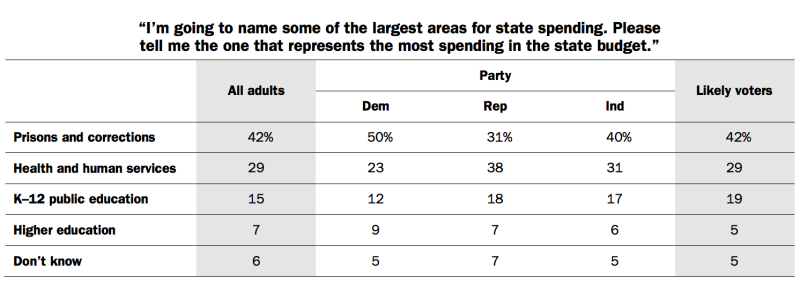"We still see very low knowledge," says Mark Baldassare, PPIC's president and pollster.
Here are the two questions in which Californians seem to keep sending a mixed message. First, the knowledge test:

As has been the case now for every single year the question has been asked, Californians think prisons are the big kahuna of state government spending. But in truth, the answer is actually K-12 schools.
Prisons, per the 2015-16 state budget proposed by Gov. Jerry Brown earlier this month, account for less than 8 cents of every dollar in total state spending (about 9 cents if you're looking just at the state's general fund). On the other hand, K-12 schools take up 29 cents of every total state dollar (and almost 42 cents of every general fund dollar) -- easily the biggest single spending category.
(Note: PPIC groups together "health and human services," which are these days being counted separately in state spending data. Due to some pretty big growth in state spending on health through the Affordable Care Act, these two sectors combined are almost 33 cents of every total state dollar -- thus edging out K-12 education. But we digress.)
Californians have been consistent in their lowballing of K-12 spending. As PPIC points out, the question has now been asked for almost 10 consecutive years and no more than 30 percent of citizens have ever picked the right answer. Prisons always seems to come out on top.
Needless to say, one response would be: Hey, we elect lawmakers to keep tabs on tax dollars and make decisions on where they're spent.
Which brings us to the follow-up question.

Californians, perhaps because of the state's robust initiative and referendum process, like to get under the hood and tinker with the engine's performance. And as the poll shows, the notion of voters making some of the state's budget decisions is widely popular among partisans and independents alike.
But don't fault the voters, says PPIC's Baldassare.
"We have a very complex budget system," he says, "and one that is not transparent to the average voter."
And after a decade of asking these questions, both in good and bad economic times, the pollster says it's quite clear that voter education" is not an area on which we've made great progress."
Needless to say, no one thinks it's an easy thing to fix. If anything, the state's budget has gotten more complicated over the decade in which PPIC has been asking this knowledge-and-power set of questions. And political campaigns, from bonds to rainy day reserve funds and mandates about local versus state expenses, often sell proposals in generalities. No doubt a decade's worth of headlines about the problems in California prisons, from high health care costs to overcrowding, haven't helped either.
Still, the results of the polling are unsettling.
"It's a major disconnect between how the state operates," says pollster Baldassare, "and what the state's residents know about it."


